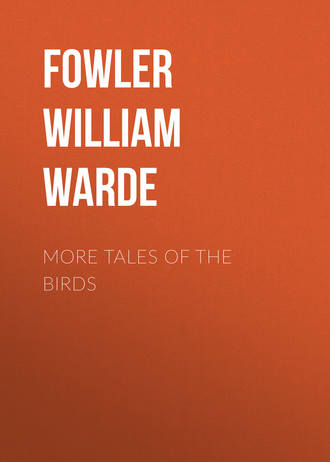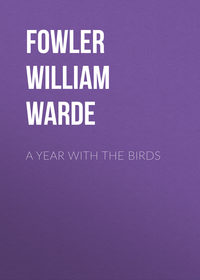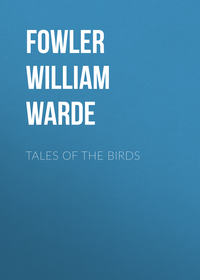 полная версия
полная версияMore Tales of the Birds
The rain went on next day, and when at last it stopped the strawberry-bed was sodden and uninviting. The Member, tired of staying in the house, and eager to get back to his London suburb, where certain fruits should now be ripening on the walls of a small rectangular garden, happily free from birds, proposed that they should travel thither, and perhaps take a short tour on the Continent. By August, he urged, the garden would be delightful again, and the rowan-berries would be in all their glory; and perchance even the blackbirds would have gone into the country for a change, willing to leave poor Man a trifle in his own garden, after six months of stuffing themselves and their young.
To this plan the Poet was brought to consent for he felt a little tried by his friends both human and winged. But Bessie would not go; she had too much to do at home, she said. The fact was that during those rainy days she and the Member had entered into a conspiracy with Joseph Bates and the cook – a conspiracy of which indeed, poor soul, she felt a little ashamed; but the sight of those empty white jam-pots was too much for her, and a little plotting seemed unavoidable if they were to get filled. Joseph was instructed to procure a supply of nets, and the cook a supply of sugar. The conspirators kept their secrets, and for once a plot went off without detection. The day arrived; the Poet was carried off, half unwilling, into exile: by nightfall Joseph had netted all the gooseberries and currants, and within a week a fair fruit-harvest graced the cupboard shelves.
The blackbirds and their friends knew not what to make of it. It was bad enough to be disturbed, just as you were enjoying a juicy gooseberry, by the Poet mooning up and down the garden path; but to have their sweet freedom curtailed by grievous netting in the one romantic home of liberty left them in a malicious and self-seeking village – this was the unkindest cut of all. Depressed and angry, they determined to withdraw for a while and moult, and to leave the garden to the mercy of the grubs and wasps; when August came they might perhaps return to see how far wilful Man was having his own way.
Mid-August arrived, with its gentle indications of approaching autumn, its deepening colours and grey dewy mornings. The rowan-berries were turning a rich red, and Bessie longed for the Poet’s coming that he might fill his eyes with this last glory of the garden before the autumn set in. The nets had been long removed from the bushes, and the birds were beginning to return to the garden and resume their duties as grub-eaters – nay, some of them were even breaking out again into song. The only drawback to their happiness was the arrival of two nephews of the Poet for their holidays, who prowled about the garden with an air-gun, letting fly little leaden bullets at the birds with very uncertain aim.
These boys, thus employed the Poet found on his return, and strictly enjoined to restrict their sport to such cornfields as they might find to be the especial prey of the omnivorous sparrow. He noted the presence of his birds with joy, and was still more delighted to find his treasured rowans covered with pendulous bunches of magnificent red berries, which would be a daily treat to his eyes for weeks to come. They had home-made jam that evening, and he took it as a matter of course and asked no questions.
The next morning broke fresh and fine, and the Poet threw open his window long before any one in the house was stirring. His mind was filled with comfortable thoughts of home after the discomforts of foreign travel; how delicious was a garden in August – one’s own garden, with one’s own birds and flowers and trees!
Ah, hapless Poet! Do not look at your beloved rowans; there is a sight there that will not please you!
Three blackbirds, a missel-thrush, and half-a-dozen starlings, were hard at work snipping off the berries, and gaps in the golden bunches already told the tale of what was to happen; the ground below was strewn with the relics of the feast, which these careless epicures were leaving to rot unheeded. The Poet’s face grew dark.
“Confound it all,” he broke out, with quite unusual vehemence, “they can’t have everything!” And he looked about the room – the truth must out – for something to throw at his darlings. But if he threw his boots or his soap, he might have to go and pick them up again, with Joseph Bates looking on sardonically; and then another thought, a wicked thought, came into his head and prevailed over him. He crepe softly downstairs, found the air-gun and the box of little bullets lying on the hall table, and carried them guiltily upstairs. The gun was loaded the indignant Poet leant out of the window and took a trembling aim at one black robber. His finger was on the trigger, and in another moment he might have been a conscience-stricken man for life, when a bright metallic sound suddenly broke upon his ear and held his hand.
Tac-tac-tac! Tac! Ta-tac!
What was it that seemed so familiar to his Yorkshire ears, bringing up mental visions of long rambles over bracing moors? Softly as a cat the Poet stole downstairs again, replaced the gun on the table, and returned swiftly with a field-glass, which now showed him, as he expected, the grey-black plumage and white crescent of a Ring-ousel. Little did that wandering stranger, so happy in the discovery, here in the far south, of its beloved northern berries, imagine that its voice had saved the Poet’s hands from bloodshed, and his mind from a lifelong remorse!
He knelt long at the window, watching the berries disappear without demur, dreaming of rushing streams and purple heather, and welcoming in his heart the stranger to the feast. Then rousing himself he fetched his wife to share his pleasure, and told her of his boyhood among the moors, and of the Ring-ousel’s nest found in the gorsebush as he was fishing in the tumbling beck. And then he told her of the air-gun – and she told him of the conspiracy.
From that moment peace returned to the garden and to the Poet’s mind. All day long they heard and saw the Ring-ousel, who could not find it in his heart to leave the berries, and delayed his journey southward for a whole day to enjoy them. Joseph Bates looked at him with indifference when the Poet pointed him out. “The thieves are welcome to anything they can get there,” he said, pointing to the tree: “that fruit’s no mortal use to no one. But they’ve had a lot more than their share this year of what’s good for us poor men and women,” he added; “and if I may make so bold, Sir, I would throw it out as that kind of thing should not happen next year.”
The Parson came up the garden walk and joined the group: the news of the Ring-ousel had reached him.
“There he is,” said the Poet “and there they all are, taking my berries as they’ve taken my fruit. And as far as I’m concerned they may have it every bit; but for my wife’s sake I must consent to a compromise, if there is one.”
“Well,” said the Parson, “give them a tithe of all you have. Give them every tenth fruit tree, and a corner of the strawberry bed. As for the rowan-berries, you must let them go.”
“And welcome,” said the Poet; and Bessie and old Joseph made no objection.
Next year the Parson’s compromise was carried out; and Man successfully asserted his right to share in the Blackbirds’ feast.
THE END


